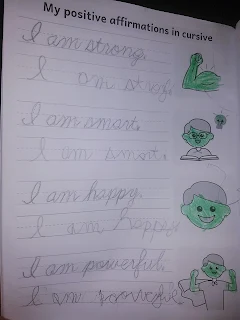Search This Blog
Learning ideas for parents and caregivers educating toddlers and little homeschoolers!
Featured
- Get link
- X
- Other Apps
24 Fun Writing Activities for Young Writers
It's #Nationalhandwritingday and what better time to talk about fun learning activities to turn young writers into great writers!?
Before we jump into the activities let's all agree that writing, like any other skill, should be practiced daily and often. As the old adage meant to say; practice makes permanent!
 |
| "22. Emotion Exploration" |
Keep reading for a list of 24 straightforward activities to get young children writing everyday this year:
1. Story Starters: Provide sentence prompts to spark their creativity.
2. Picture Prompt Writing: Use images to inspire storytelling.
3. Letter Writing: Encourage them to write letters to family or friends.
4. Journaling: Develop a daily writing habit with simple reflections.
5. Alphabet Adventures: Create short stories using each letter of the alphabet.
6. Rhyming Words: Play with rhymes to enhance phonetic awareness.
7. Nature Descriptions: Write about outdoor experiences and observations.
8. Creative Drawing and Describing: Combine drawing with short descriptions.
9. Shape Poems: Shape poetry using basic shapes for creative expression.
10. Puppet Playwriting: Write scripts for puppet shows to boost imagination.
11. Recipe Writing: Craft simple recipes and instructions.
12. Name Stories: Explore the origin and meaning of their names in stories.
13. Colorful Descriptions: Use vivid language to describe colors.
14. Adventure Logs: Document imaginary journeys and adventures.
15. Acrostic Poems: Spell words vertically and create poems around them.
16. Interviews: Pretend interviews with favorite characters or family members.
17. Thank You Notes: Teach gratitude through writing thank-you notes.
18. Memory Recall: Encourage writing about memorable experiences.
19. Inventive Spelling: Allow creativity in spelling for early expression.
20. Family Stories: Record anecdotes about family members.
21. Fantasy World Building: Create imaginary worlds and characters.
22. Emotion Exploration: Express feelings through short writings.
23. Comparisons: Compare and contrast different objects or animals.
24. Daily Prompts: Provide daily writing prompts for consistent practice.
- Get link
- X
- Other Apps
Popular Posts
🇨🇦 100 Field Trip Ideas for Kids Manitoba
- Get link
- X
- Other Apps
The Wild Robot Movie vs. The Wild Robot Book
- Get link
- X
- Other Apps


Comments
Post a Comment